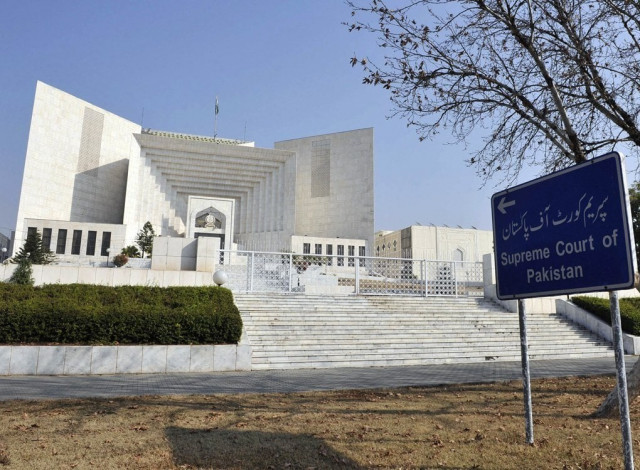Law in conflict with basic rights 'can be annulled'
Aitzaz Ahsan says annulment of legislation applies to future

Supreme Court Justice Mansoor Ali Shah on Tuesday remarked that a law could be annulled if it was against basic rights.
Sitting on a five-judge bench, headed by Justice Umar Ata Bandial, to hear the review petition of the sacked government employees, Justice Shah said that the Supreme Court had already ruled that the process of firing the employees was correct.
At the onset of the hearing, Barrister Aitzaz Ahsan, the counsel for the employees of the Intelligence Bureau (IB), started his arguments. Ahsan told the bench that the then caretaker government had dismissed the employees without giving any notices to them or to the attorney general for Pakistan.
The counsel added that later the federal government corrected the caretaker government's wrong decision by enacting parliamentary legislation. Justice Shah asked why a law was made for the employees, who were fired during a particular period.
Between 1993 and 1996, there was no civil war nor was there any pandemic or Covid during that time, Justice Shah remarked. Many employees had been fired before and after this period, why make a law only for the people who are sacked in a certain period, he asked.
Read SC strikes down sacked employees law
Lawyer Aitzaz Ahsan said that the employees were sacked by the caretaker government on its last day through an executive order. He said that it was also a matter of division of powers, adding, however, that parliament was independent in the legislation.
Justice Shah said that if the law was against the fundamental rights, then the court could annul it. Ahsan said that if an act of parliament was in conflict with fundamental rights it could be declared null and void but added that the annulment applied to the future. “Revoking a law does not affect past recruitment.”
Justice Bandial told the lawyer that regardless the caretaker government’s act of sacking the employees was right or wrong, a decision had been made and the Supreme Court could not look into the matter in a review case.
Justice Shah said that the Supreme Court had ruled in a decision that the process of sacking the employees was correct. Ahsan said that a caretaker government did not have the authority to give jobs or sack them. He added that no ordinance or act was required in the case of the sacked IB employees.
Also sitting on the bench, Justice Qazi Mohammad Amin told Ahsan that in that situation he had no case for the review. Ahsan responded that the IB employees worked for 10 more years even after the issuance of the ordinance.
Justice Shah asked if the appointment of a person was declared unconstitutional, would he be entitled to benefits after 10 years of service. He added that thousands of employees had been sacked correctly or incorrectly since 1947.
Ahsan replied that there was a decision of the Supreme Court on this subject. He mentioned that the Supreme Court had also protected the privileges in the judges' pension case.
After conclusion of the arguments of Ahsan, the lawyer for the Sui Northern Gas Company and the State Life Insurance employees, Latif Khosa, started his arguments. He told the court that the employees were recruited between 1993 and 1996.
He added the then interim government sacked all these employees by executive order in 1997. However, Khosa said, the dismissed employees approached the Supreme Court later, and some employees were reinstated. Later, the case was adjourned till Wednesday (today).



















COMMENTS
Comments are moderated and generally will be posted if they are on-topic and not abusive.
For more information, please see our Comments FAQ